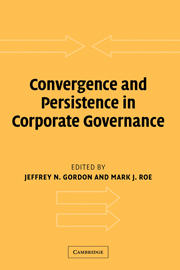Book contents
- Frontmatter
- Contents
- List of figures
- List of tables
- List of contributors
- Acknowledgments
- Introduction
- PART I Systemic issues
- 1 The end of history for corporate law
- 2 A theory of path dependence in corporate ownership and governance
- 3 Path dependence and complementarity in corporate governance
- 4 Globalizing corporate governance: convergence of form or function
- PART II Government players
- PART III Specific institutions
- Index
1 - The end of history for corporate law
Published online by Cambridge University Press: 04 March 2010
- Frontmatter
- Contents
- List of figures
- List of tables
- List of contributors
- Acknowledgments
- Introduction
- PART I Systemic issues
- 1 The end of history for corporate law
- 2 A theory of path dependence in corporate ownership and governance
- 3 Path dependence and complementarity in corporate governance
- 4 Globalizing corporate governance: convergence of form or function
- PART II Government players
- PART III Specific institutions
- Index
Summary
Introduction
Recent scholarship has emphasized institutional differences in governance, share ownership, capital markets, and business culture among European, American, and Japanese companies. Despite this apparent divergence, however, the basic law of corporate governance – indeed, most of corporate law – has achieved a high degree of uniformity across these jurisdictions, and continuing convergence toward a single standard model is likely. The core legal features of the corporate form were already well established in advanced jurisdictions one hundred years ago, at the turn of the twentieth century. Although there remained considerable room for variation in governance practices and in the fine structure of corporate law throughout the twentieth century, the pressures for further convergence are now rapidly growing. Chief among these pressures is the recent dominance of a shareholder-centered ideology of corporate law among the business, government, and legal elites in key commercial jurisdictions. There is no longer any serious competitor to the view that corporate law should principally strive to increase long-term shareholder value. This emergent consensus has already profoundly affected corporate governance practices throughout the world. It is only a matter of time before its influence is felt in the reform of corporate law as well.
Convergence past: the rise of the corporate form
We must begin with the recognition that the law of business corporations had already achieved a remarkable degree of worldwide convergence at the end of the nineteenth century.
- Type
- Chapter
- Information
- Convergence and Persistence in Corporate Governance , pp. 33 - 68Publisher: Cambridge University PressPrint publication year: 2004
- 55
- Cited by



